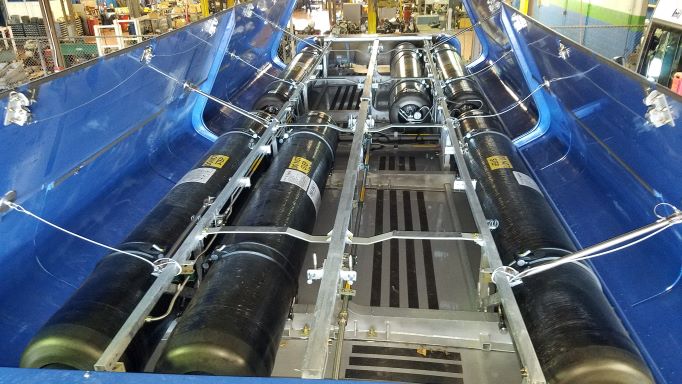Transit agencies have four key areas they can focus on if they want to maximize the use of their CNG fleets. They include adhering to the proper vehicle inspection intervals; establishing standard operating procedures for maintenance, repairs, and potential incidents; encouraging up-to-date training for drivers and technicians; and requiring certification for all CNG fuel system inspectors. All of these tie back to the singular focus of vehicle safety, especially since these buses rely on high-pressure fuel and routinely operate in densely populated areas.
Vehicle Inspection Intervals
According to the Federal Motor Vehicle Safety Standard (FMVSS) 304, all CNG cylinders must be inspected every 3 years or 36,000 miles, whichever comes first, as well as after any fire or accident. Back in 2008, NGV industry best practices were updated to include inspection of the entire high-pressure portion of the fuel system. In order to detect and repair any potential safety concerns, current policy lists four inspection intervals that transit fleets (and the industry at large) should adopt.
Pre-Service Inspections. These are detailed visual inspections of all high-pressure fuel system components that should be performed by your qualified or certified CNG fuel systems inspectors upon delivery of new CNG vehicles. They’re meant to verify that the fuel systems on board these units have been installed according to code and that no initial damage exists. We stress the importance of performing these baseline inspections independently of vehicle manufacturers or dealers because, as the fleet owner, you are ultimately liable for any undetected safety issues.
Driver Pre- and Post-Trip Inspections. These are daily checks performed by bus drivers on any easily accessible and visible CNG system components. Buses found with accidental damage should not be driven until a detailed visual inspection is performed by a qualified technician, especially if that damage is found on their cylinder shields.
General Visual Inspections. These are routine inspections of all visible CNG fuel system and mounting components performed by trained technicians during maintenance. Damaged components should either be repaired or replaced depending on severity, while shield damage should immediately prompt a detailed visual inspection to determine whether the cylinders beneath have also been affected.
Detailed Visual Inspections. As the name implies, these are the most thorough inspections. They cover the entire high-pressure fuel system, and are performed by qualified or certified CNG fuel system inspectors. These are also the inspections required specifically by FMVSS 304.
Standard Operating Procedures
SOPs should be implemented by transit teams to anticipate and prepare drivers and technicians for the possibility of hazardous conditions or emergencies they could encounter while vehicles are being operated or repaired. These procedures should outline the steps needed to resolve each situation safely and effectively.
Drivers should know how to react in an accident if passengers need to be evacuated, whether they should assist first responders, when they should or shouldn’t drive a vehicle, as well as when and where a required Detail Visual Inspection should take place.
Technicians should know the policy for bringing buses into the maintenance facility, procedures and conditions for depressurizing or defueling CNG cylinders, safety protocols for welding or hot work on buses, as well as the steps to follow in case the maintenance facility’s methane detection system is activated.
Inspections also come with their own SOP, including the tools that are necessary, requirements for inspection recordkeeping, requirements for removing cylinder shields, when and how to defuel and isolate cylinders if they have Level 2 or 3 damage, and how to destroy or dispose of cylinders when they’re damaged or expired.
CNG Training
Training for your team members is important for two reasons: first, it provides a comprehensive understanding on how to properly inspect and maintain CNG fuel systems; second, it improves knowledge of newer model buses that are deployed in the fleet. While it may be tempting to opt for specific product familiarization provided by bus or fuel system manufacturers, this doesn’t provide the depth of knowledge and specific skills that fully qualify technicians to do their jobs.
Drivers should know the properties of natural gas, and how the safety features on their vehicles work. They should be able to detect signs of damage, potential fuel leaks, as well as visible wear on fuel system components.
Technicians should understand the unique properties and operating characteristics of compressed gas. Level 1 safety training will make them aware of all CNG fuel systems components and their functions. More advanced technicians conducting fuel system inspections will need Level 2 training in order to be familiar with installation code requirements and standards, as well as how to assess damaged components and cylinders. One step further is Level 3 training for those responsible for diagnostics and repair, so that they can distinguish performance issues caused by a fuel problem, a fuel system problem, or an engine problem.
Fuel System Inspector Certification
While there is no current national requirement for CNG fuel system inspectors to be certified, certification is a recommended best practice within the NGV industry. By taking this independent assessment, technicians prove they are fully qualified to perform CNG fuel system inspections.
This includes understanding the function of each CNG fuel system component; identifying signs of damage and disrepair; distinguishing between four types of CNG cylinders; identifying the manufacturing and installation standards for all CNG fuel systems; providing accurate and effective CNG fuel system inspections; knowing when cylinders can be repaired or must be disposed of; and properly defueling and disposing of condemned cylinders.
If your team has questions regarding these points or their associated training, we’re ready to help. NGVi is the only ASE–accredited training provider in the alternative fuels industry, which means we’re your full-service resource on how to maximize the use, safety, and liability of your CNG fleet. Give us a call at 800-510-6484 to discuss.

